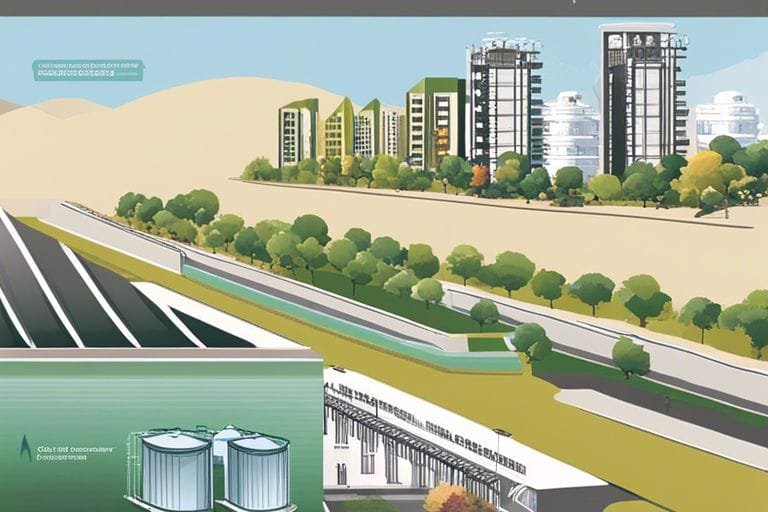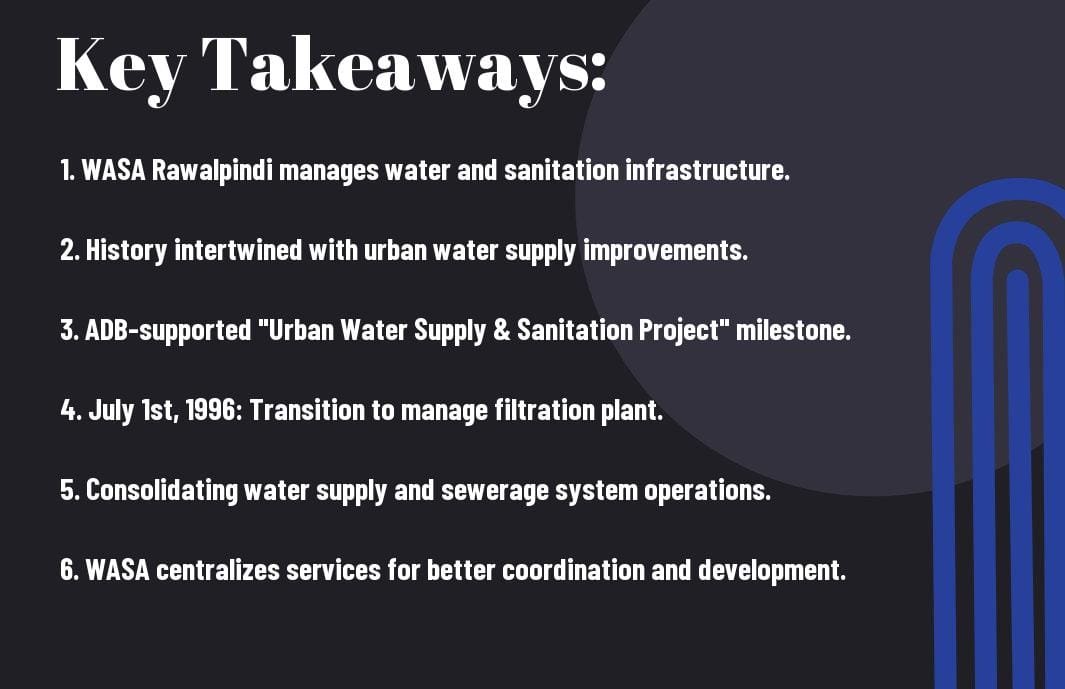Just like its counterparts in other Pakistani cities, WASA Rawalpindi is a governmental body responsible for the planning, design, development, maintenance, and operation of water supply and sewage systems. The comprehensive history of WASA Rawalpindi highlights its critical role in managing the city’s water and sanitation infrastructure, guaranteeing residents have access to clean water and efficient sewerage services. One pivotal moment in its history was the launch of the “Urban Water Supply & Sanitation Project,” made possible by the ADB (Asian Development Bank) Loan No. 1260-PAK (SF), which significantly advanced the city’s water and sanitation services.
Major milestones in WASA Rawalpindi’s journey include the takeover of key operations from the Public Health Engineering Department in 1996, solidifying its role in water supply management and service enhancement. By centralizing water and sewerage services under one agency, WASA Rawalpindi aimed to improve efficiency, coordination, and the development of imperative infrastructure to meet the needs of Rawalpindi’s growing population. Through strategic partnerships and international financing, WASA Rawalpindi continues to enhance the quality of life for residents by providing improved water supply and sanitation facilities.
Key Takeaways:
- WASA Rawalpindi’s Role: WASA Rawalpindi, like its counterparts in other Pakistani cities, is responsible for planning, designing, developing, maintaining, repairing, and operating water supply and sewage systems to ensure residents have access to clean water and efficient sewerage services.
- Historical Significance: The history of WASA Rawalpindi reflects its crucial role in managing the city’s water and sanitation infrastructure, with key milestones including the takeover of water supply services from the Public Health Engineering Department (PHED) and defunct municipal authorities.
- Impact of Urban Water Supply & Sanitation Project: The initiation of the “Urban Water Supply & Sanitation Project” with support from the Asian Development Bank marked a significant milestone in the development and expansion of water and sanitation services in Rawalpindi, aiming to enhance the quality of life for residents through improved facilities.
History of WASA Rawalpindi
Formation and Early Years
To understand the history of WASA Rawalpindi, it is necessary to probe into its formation and early years. Some decades ago, as Rawalpindi’s population began to grow rapidly, the need for a dedicated agency to manage water supply and sanitation became increasingly evident. In response to this demand, the Water and Sanitation Agency (WASA) was established to oversee the planning, development, and maintenance of water and sewage systems in the city. In its early years, WASA Rawalpindi focused on laying the groundwork for efficient water supply and sanitation services to meet the needs of the burgeoning urban population.
Transition and Expansion of Responsibilities
For WASA Rawalpindi, a significant turning point came in July 1st, 1996, when the agency took over critical water supply and sewerage infrastructure from various departments. This marked a crucial transition towards centralizing the management of water and sanitation services under a single umbrella, enhancing coordination and overall service delivery. Following this transition, WASA Rawalpindi expanded its responsibilities to include the operation of key facilities previously under the purview of other entities.
For instance, taking over the Filtration Plant and Conductance Main from the Public Health Engineering Department (PHED) allowed WASA Rawalpindi to streamline operations and improve the efficiency of water supply services. This move was critical in consolidating control over necessary infrastructure, paving the way for more effective maintenance and development of water and sanitation systems in Rawalpindi.

The Urban Water Supply & Sanitation Project
If viewed through the lens of historical significance, the initiation of the “Urban Water Supply & Sanitation Project” stands out as a pivotal moment in the development of water and sanitation infrastructure in Rawalpindi. This project, made possible through the ADB Loan No. 1260-PAK (SF), marked a turning point in the efforts to modernize and expand water supply and sewage systems in the city.
Initiatives and Objectives
For the officials at WASA Rawalpindi, the “Urban Water Supply & Sanitation Project” represented a strategic endeavor to address the growing demands for clean water and efficient sewerage services in the city. The primary initiatives and objectives of the project revolved around upgrading the existing infrastructure, expanding service coverage to underserved areas, and implementing modern technologies to enhance operational efficiency.
Impact on the Development of Water and Sanitation Services
Urban development in Rawalpindi witnessed a substantial transformation as a result of the “Urban Water Supply & Sanitation Project.” The project’s impact extended beyond just physical infrastructure upgrades; it catalyzed a shift towards sustainable water management practices and improved sanitation services. The project contributed significantly to reducing water-borne diseases, improving public health outcomes, and fostering economic growth in the region.
Another crucial aspect of the project was its emphasis on capacity building and community engagement. By empowering local stakeholders and fostering a sense of ownership among residents, the project laid the foundation for long-term sustainability in water supply and sanitation services.
Major Milestones in the History of WASA Rawalpindi
Takeover of Filtration Plant and Conductance Main
Takeover: On July 1st, 1996, WASA Rawalpindi achieved a significant milestone by taking over the operation of the Filtration Plant and Conductance Main from the Public Health Engineering Department (PHED). This pivotal moment marked the agency’s direct involvement in managing key components of the city’s water supply infrastructure, signifying a crucial step towards enhancing operational efficiency and service delivery.
Centralization of Water and Sanitation Services
On: Following the takeover of the Filtration Plant and Conductance Main, WASA Rawalpindi begined on a mission to centralize water and sanitation services within the city. By assuming responsibility for the water supply and sewerage system from the defunct municipal authorities, WASA aimed to streamline operations, improve coordination, and bolster maintenance efforts to meet the increasing demands of Rawalpindi’s growing population.
Main: The centralization of water and sanitation services under WASA Rawalpindi’s umbrella was a significant move that allowed for more efficient management of critical infrastructure. By consolidating responsibilities and resources, the agency could better address the expanding needs of the city’s residents in terms of clean water supply and effective sewage disposal. This strategic shift towards centralized management was instrumental in laying the groundwork for future development and enhancement of water and sanitation facilities in Rawalpindi.
Efforts to Improve Urban Infrastructure
All cities face the challenge of meeting the increasing demands for clean water and efficient sewerage services as their populations grow. In response to these challenges, WASA Rawalpindi has undertaken various efforts to improve the urban infrastructure of the city. One key aspect of these efforts has been centralizing water and sanitation services under the agency’s management to enhance coordination and efficiency.
Response to Increasing Demands
Efforts to address the increasing demands for water and sanitation services have led WASA Rawalpindi to focus on expanding and upgrading the existing infrastructure. By investing in the development of new water supply systems and sewerage networks, WASA aims to meet the growing needs of the city’s residents and improve the overall quality of life in Rawalpindi.
Leveraging International Financing for Major Projects
With the support of international financing, WASA Rawalpindi has been able to undertake major infrastructure projects that have significantly enhanced the water supply and sanitation services in the city. Through partnerships with organizations like the Asian Development Bank (ADB), WASA has been able to secure funding for crucial initiatives that would have otherwise been challenging to implement solely with local resources.
Role of WASA Rawalpindi in Enhancing Quality of Life
Now, as we probe into the pivotal role of WASA Rawalpindi in enhancing the quality of life for residents, it is evident that the agency’s efforts have significantly improved water supply and sanitation facilities in the city.
Improved Water Supply and Sanitation Facilities
An integral aspect of WASA Rawalpindi’s mission has been the enhancement of water supply and sanitation facilities. Through strategic planning and diligent execution, the agency has modernized infrastructure, expanded service coverage, and upgraded treatment plants and distribution networks. By ensuring the availability of clean water and efficient sewerage services, WASA Rawalpindi has played a crucial role in safeguarding public health and promoting sustainable urban development.
Contribution to the Well-being of Residents
On a deeper level, WASA Rawalpindi’s contributions extend beyond infrastructure development to directly impact the well-being of residents. By providing reliable access to safe drinking water and proper sanitation, the agency has helped reduce waterborne diseases, improve hygiene practices, and enhance overall quality of life for the people of Rawalpindi.
Another necessary aspect of WASA Rawalpindi’s contribution to the well-being of residents is its commitment to community engagement and education. By raising awareness about water conservation, proper waste disposal, and hygiene best practices, the agency empowers individuals to take ownership of their health and environment, fostering a cleaner, healthier, and more sustainable city for current and future generations.

To wrap up
The Water and Sanitation Agency (WASA) in Rawalpindi has a rich history of overseeing the city’s water supply and sanitation infrastructure, ensuring residents have access to clean water and efficient sewerage services. The agency’s transition in 1996 marked a significant milestone as it took over key operations from the Public Health Engineering Department, allowing for a more consolidated and efficient management of water supply services. This move towards centralization, coupled with initiatives to expand services and secure international financing for projects like the “Urban Water Supply & Sanitation Project,” has been instrumental in enhancing the quality of life for Rawalpindi’s residents.
Overall, WASA Rawalpindi’s history underscores its vital role in developing and maintaining important water and sanitation services for the city. By continuously improving infrastructure, expanding responsibilities, and leveraging external support, the agency has been proactive in meeting the growing demands of a burgeoning urban population. Moving forward, WASA Rawalpindi will continue to play a crucial part in ensuring sustainable access to clean water and efficient sewerage services, contributing to the overall well-being and development of the city and its residents.
FAQ
Q: What is the Water and Sanitation Agency (WASA) in Rawalpindi?
A: The Water and Sanitation Agency (WASA) in Rawalpindi, similar to its counterparts in other Pakistani cities, is a governmental body responsible for the planning, design, development, maintenance, repair, and operations of water supply and sewage systems. It plays a crucial role in managing the city’s water and sanitation infrastructure to ensure residents have access to clean water and efficient sewerage services.
Q: What is the history of WASA Rawalpindi and its significance in the urban water supply and sanitation sector?
A: The history of WASA Rawalpindi is intertwined with efforts to enhance urban water supply and sanitation infrastructure, particularly with international financing support. A pivotal moment in its history was the initiation of the “Urban Water Supply & Sanitation Project” facilitated through the ADB Loan No. 1260-PAK (SF). This project marked a significant milestone in expanding water and sanitation services in Rawalpindi, reflecting WASA’s commitment to improving infrastructure for the city’s residents.
Q: What are some major milestones in the history of WASA Rawalpindi?
A: One major milestone was on July 1st, 1996, when WASA Rawalpindi took over the operation of the Filtration Plant and Conductance Main from the Public Health Engineering Department (PHED). This marked a crucial transition consolidating water supply services under WASA’s management to enhance efficiency and service delivery. Subsequently, WASA also assumed responsibility for the water supply and sewerage system from the defunct municipal authorities, aiming to centralize services for better coordination, maintenance, and development of vital infrastructure to meet the growing population’s needs. These initiatives reflect WASA Rawalpindi’s commitment to improving urban infrastructure and quality of life through enhanced water supply and sanitation facilities.
